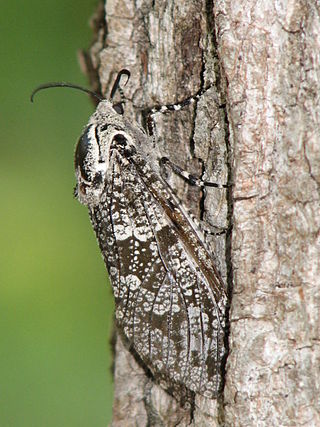
The common whitethroat or greater whitethroat is a common and widespread typical warbler which breeds throughout Europe and across much of temperate western Asia. This small passerine bird is strongly migratory, and winters in tropical Africa, Arabia, and Pakistan.

Sander is a genus of predatory ray-finned fish in the family Percidae, which also includes the perches, ruffes, and darters. They are also known as "pike-perch" because of their resemblance to fish in the unrelated Esocidae (pike) family. They are the only genus in the monotypic tribe Luciopercini, which is one of two tribes in the subfamily Luciopercinae,

The Cossinae are the nominate subfamily of the Cossidae. The caterpillars of several Cossinae species, such as the carpenterworm and the goat moth, are significant pests. On the other hand, in Chile the caterpillars of the Chilean moth are collected on a commercial scale for sale as fishing bait and terrarium pet food; they are usually called "butterworms" in international trade.

The Volga pikeperch, or Volga zander, is a species of fish in the perch family Percidae. It is found in Austria, Azerbaijan, Bosnia and Herzegovina, Bulgaria, Croatia, Germany, Hungary, Moldova, Romania, Russia, Serbia, Slovakia, and Ukraine.

Jordanita is a genus of moths of the family Zygaenidae.
Alosa volgensis, the Volga shad, is a clupeid fish, one of the species of shad endemic to the Caspian Sea region.

Pterophorus is a genus of moths in the family Pterophoridae.
Jordanita volgensis is a moth of the family Zygaenidae. It is known from eastern Ukraine, southern Russia, Transcaucasia, Turkey and Syria.
Pterophorus volgensis is a moth of the family Pterophoridae. It is found in Russia.
Deserticossus arenicola is a species of moth of the family Cossidae. It is found in Russia (Dagestan), Armenia, Azerbaijan, Georgia, Turkmenistan, Kazakhstan, Uzbekistan, Kyrgyzstan, north-western China, Iran, Afghanistan, Pakistan, Egypt (Sinai) and Jordan.
Deserticossus pulverulentus is a species of moth of the family Cossidae. It is found in Kazakhstan, Kyrgyzstan, Uzbekistan, Turkmenistan, north-western China (Xinjiang) and Israel.
Deserticossus campicola is a species of moth of the family Cossidae. It is found in Russia, Kazakhstan, Kyrgyzstan, Azerbaijan, Uzbekistan and western China.
Deserticossus sareptensis is a species of moth of the family Cossidae. It is found in the south-eastern part of European Russia.
Lutilabria is a genus of moths in the family Gelechiidae.
Holcocerus is a genus of moths in the family Cossidae.
Deserticossus is a genus of moths in the family Cossidae.
Phytoecia affinis is a species of beetle in the family Cerambycidae. It was described by Harrer in 1784, originally under the genus Leptura. It has a wide distribution in Europe.
Gobio volgensis is a species of gudgeon, a small freshwater in the family Cyprinidae. It is endemic to the Volga River basin in Russia..
Terellia volgensis is a species of tephritid or fruit flies in the genus Terellia of the family Tephritidae.
Linaria volgensis is a species of flowering plant in the family Plantaginaceae, native to central European Russia. It is a narrow endemic restricted to a rare type of steppe characterized by a soil of mixed chalk and sand.





